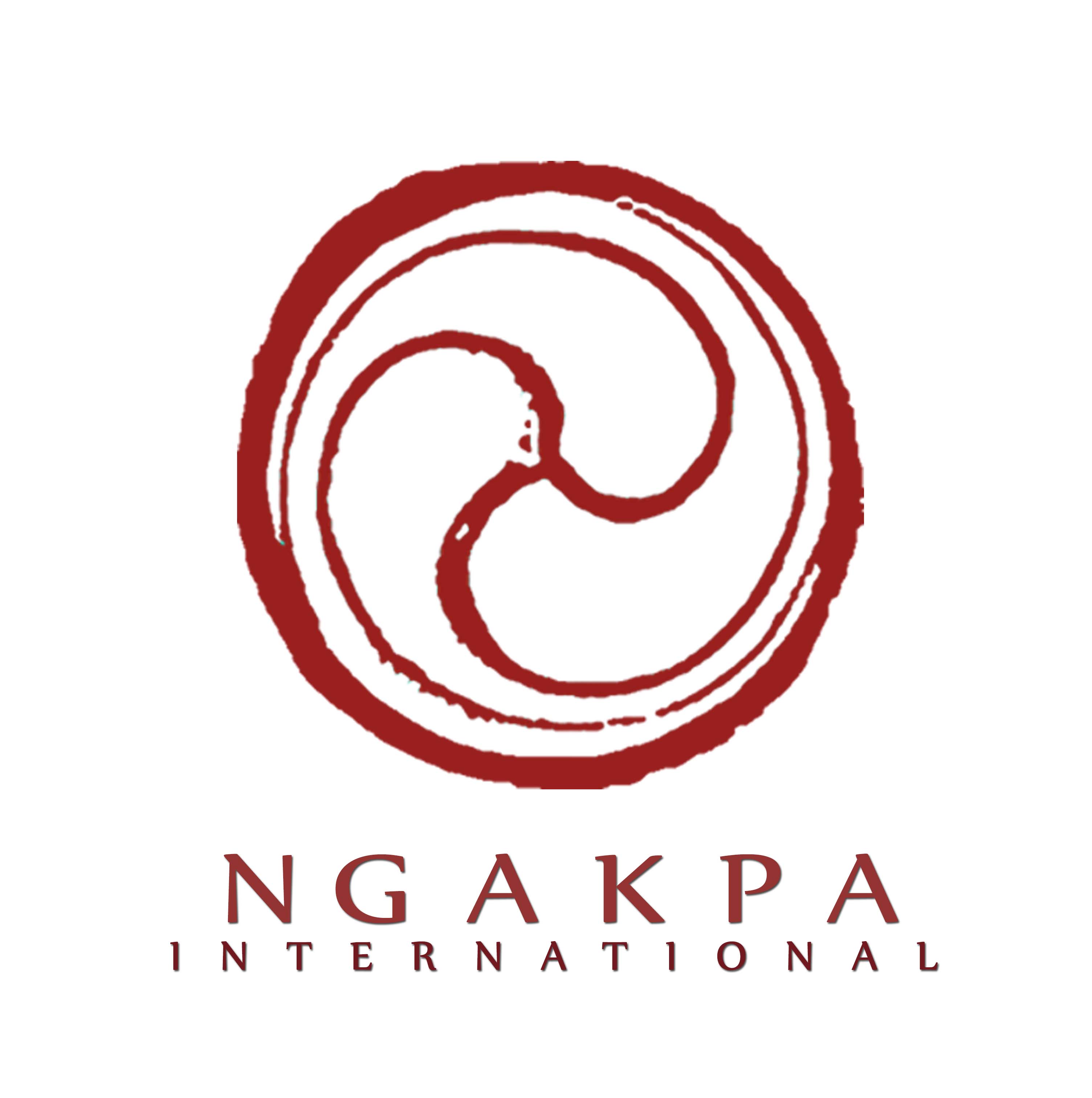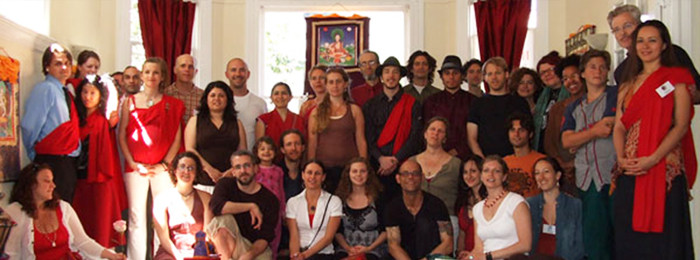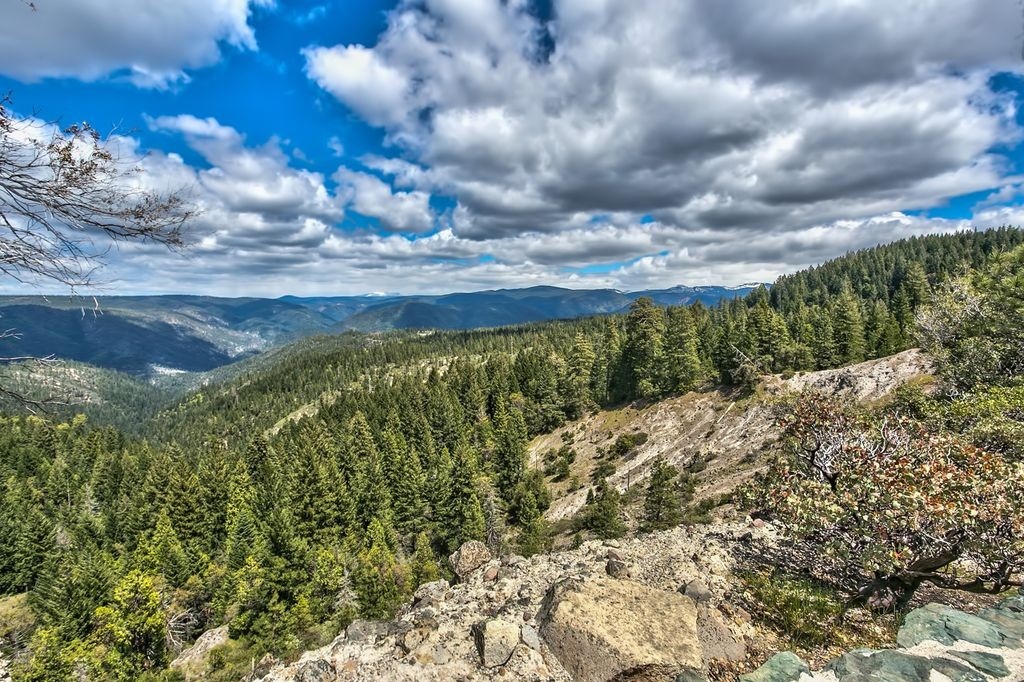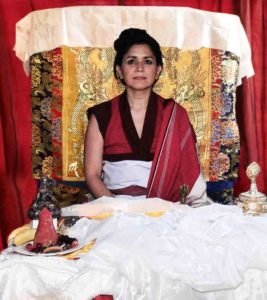The Innermost Heart of Freedom: Dzogchen Meditation Retreat
With Pema Khandro
August 20 - 25, 2019
Join Pema Khandro Rinpoche for a five-day meditation retreat in the lush meadows and scenic rolling hills of Northern California’s Tahoe National Forest. This retreat is an immersion in Tibetan Buddhism’s restorative practices to awaken peaceful stability in mind and body. This is a precious opportunity to experience the methods taught in Dzogchen meditation, Tibetan Buddhism’s most treasured path to awakening.
Retreat Details
The Annual Dzogchen retreat generally includes three practice sessions, one session of teaching as well as a class in Tibetan Yoga or restorative Bliss Yoga. The retreat schedule is set to support a rotation between meditation practice, learning Buddhist philosophy, free time, social time and rest.
For the first two days, none of the classes are mandatory, every person is encouraged to listen to their body and attend what they can. Then on Friday and Saturday, the group practices together in strict retreat, attending each session including chanting and meals together as a group. Saturday night includes a celebration after dinner. Sunday is a combination of chanting, meditation, discussion and the closing circle of the retreat.
Pema Khandro Rinpoche teaches most of the sessions, along with senior students leading Yoga and other optional classes.
The meditation sessions are generally taught in 24-minute cycles with Tibetan Yoga practices in between, with no more than three meditation cycles per class. The emphasis of practice according to Pema Khandro is quality – not quantity. Thus, many short sessions are favored over long extended sessions of poor quality. Tibetan Yoga practices help to awaken vivid clarity and make meditation more accessible. Preparatory practices open up the state of expansiveness and calm to facilitate deeper meditations.
Schedule
At the Annual Dzogchen Retreat, generally the first part of the day is focused on meditation cycles, the evening is focused on lecture, question and answer, and discussion. There is some variability in schedule from year to year, depending on the setting and the practices to be covered. However, breakfast is generally at 8am, lunch at 1pm and dinner at 6:30pm. There is an afternoon break after lunch with free time for rest or hiking.
Retreat Entrance points
Tuesday 4pm to Sunday 3pm
Friday 10am to Sunday 3pm
*All fees are non-refundable. however if after registration, you cannot attend all or a portion of the retreat, you will receive up to 50% credit towards a future retreat.
Tuesday
4pm Arrival and Registration
5:30pm Dinner
7pm Opening Ceremony
Weds – Sat
7:30am Heart Sutra
8am Breakfast
10am Class
1pm Lunch
3pm Free Time or Bliss Yoga
430 Class
630 Dinner
8pm Most nights free
Friday 8pm Chod
Saturday 8pm Tsok & Celebration
Sunday
8am Breakfast
10am-1pm Class
1:30 Lunch
3pm – Packing up & Departure
Seating
For meditation practice, students may sit in chairs or upon meditation cushions, according to whatever is most comfortable for them. If you need special accommodations, please let us know in advance. If you are not sure how to find a comfortable meditation posture, don’t worry, our expertly trained teaching assistants will help you.
Karma Yoga
The retreat is run by the entire community in attendance. Everyone participates in daily “karma yoga” which is service activities, collaborating together to hold the ideal space for deep practice and connecting with other students.
The Practices
The meditations are in the distinct style of Dzogchen which is based on the body, the senses, visualization, and perception. Each year Pema Khandro Rinpoche gives instructions from Zhine, calm abiding and Lhatong, higher seeing. But the heart of this retreat are the instructions for the practices of 21 Semzin – Holding the Mind – practices of Dzogchen, three of which are given each year.
There are also Tibetan chanting meditations which may focus on Tibetan prayers such as the Heart Sutra, Chod or Calling the Hundred Thousand Dakinis. Tibetan prayer chanting is a profoundly calming and inspiring practice. It is a way of contemplating Buddhist philosophy as well as transforming identity. Though meditation is stereotypically a silent practice – in Tibetan Buddhism, chanting meditations are far more often practiced. In the Annual Dzogchen retreats most of the meditations are silent practices however, sessions of chanting meditation are offered either once a day or two to three times throughout the retreat.
Meals
The meals at the retreat will be catered. We are radically committed to embodying practice by observing the highest standards of a healthy diet. At the retreat, the meals are vegetarian, organic, sugar-free and gluten-free. We can accommodate vegan diets as well. If you have additional special needs, please let us know, we are happy to accommodate you. Because of the presence of bears on the land (who will rip off car doors if you have food in them!) we ask that you do not keep food in your tent or cars. If you have special dietary needs please let us know, we are happy to accommodate you.
Travel to Dakini Mountain
A full address will be given after registration is completed, in a welcome email closer to the date of the event. When in cell service range, GPS gives directions all the way to Dakini Mountain.
- Sacramento International Airport (SMF) to Dakini Mountain ~ 1.5hr drive and est $100 Lyft ride
- SMF to Nevada City ~ 1hr drive
- Amtrak in Colfax to Dakini Mountain ~ est $40 Lyft ride
- Downtown Nevada City to Dakini Mountain ~ 20min and est $25 Lyft ride
Full Retreat Tuition: Tuesday, Aug 20th 4pm – Sunday, Aug 25th, 3pm
Includes tuition, 15 meals @$16/meal, and facilities fee @ $10/day. Lodging and teacher donations are separate. Member Discounts Apply to Tuition Only.
For More Information on Membership: Info@BuddhistYogis.org
| Full Retreat Aug 20-25 |
Total |
| General Tuition | 830 |
| AAP Member | 290 |
| Snow Lion Member | 560 |
| Mandala Holder Member | 722 |
| Supporter Member | 776 |
Partial Retreat Tuition: Friday, Aug 23rd 10am – Sunday, Aug 25th, 3pm
*Includes tuition, 7 meals @$16/meal, and facilities fee @ $10/day. Lodging and teacher donations are separate. Member Discounts Apply to Tuition.
For More Information on Membership: Info@BuddhistYogis.org
| Partial Retreat Aug 23-25 |
Total |
| General Tuition | 467 |
| AAP Member | 142 |
| Snow Lion Member | 305 |
| Mandala Holder Member | 402 |
| Supporter Member | 435 |
Accommodations
$21/night – Available for Members Only
Our retreat center is in the early phases without the dorms built yet. Members may bring their own tent, van or RV if staying on the land. Or you may wish to book lodging in nearby Nevada City, California and commute to the retreat site. Campers have access to rustic outdoor showers and portable toilets.
*Camping accommodations are limited and on a first come first serve basis.
Places to Stay Nearby
- Washington Hotel California ~ 10 min drive down a very curvy road to Dakini Mountain
- Harmony Ridge Lodge ~ 12 min drive to Dakini Mountain
- Outside Inn ~ 20 min drive to Dakini Mountain
- Airbnb’s in Nevada City ~ 20 min drive to Dakini Mountain
- Gold Miners Inn in Grass Valley ~ 23 min drive to Dakini Mountain
Camping Nearby
- White Cloud (US Forest Service) Camping ~ 6 min drive to Dakini Mountain
- Scotts Flat Lake Campground ~ 23 min drive to Dakini Mountain
About the Teacher
This Meditation Retreat is taught by Pema Khandro Rinpoche who is a renowned teacher and scholar in Tibetan Buddhism and founder of Ngakpa International. She specializes in teaching Vajrayana and Dzogchen practices as done by Tibetan Yogis. This is the lively Buddhist tradition that emphasizes engagement with deep spiritual practice while embracing work, family, and society. Rinpoche’s style is educational, gentle, humorous and down to earth. The retreat will include daily classes with Rinpoche include a session for Questions, Answers, and Dialogue.
To learn more about Pema Khandro visit www.PemaKhandro.org or see the ngakpa.org FAQ page at https://ngakpa.org/pema-khandro-rinpoche-faq/
To learn more about our community visit:
https://ngakpa.org/
https://buddhistyogis.org/
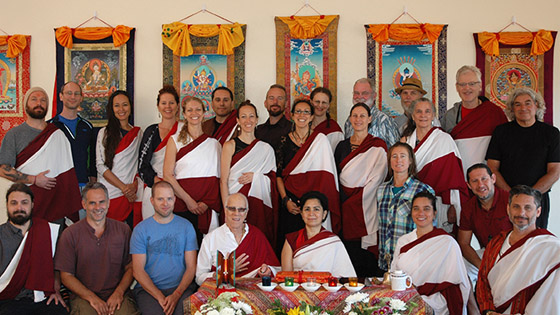
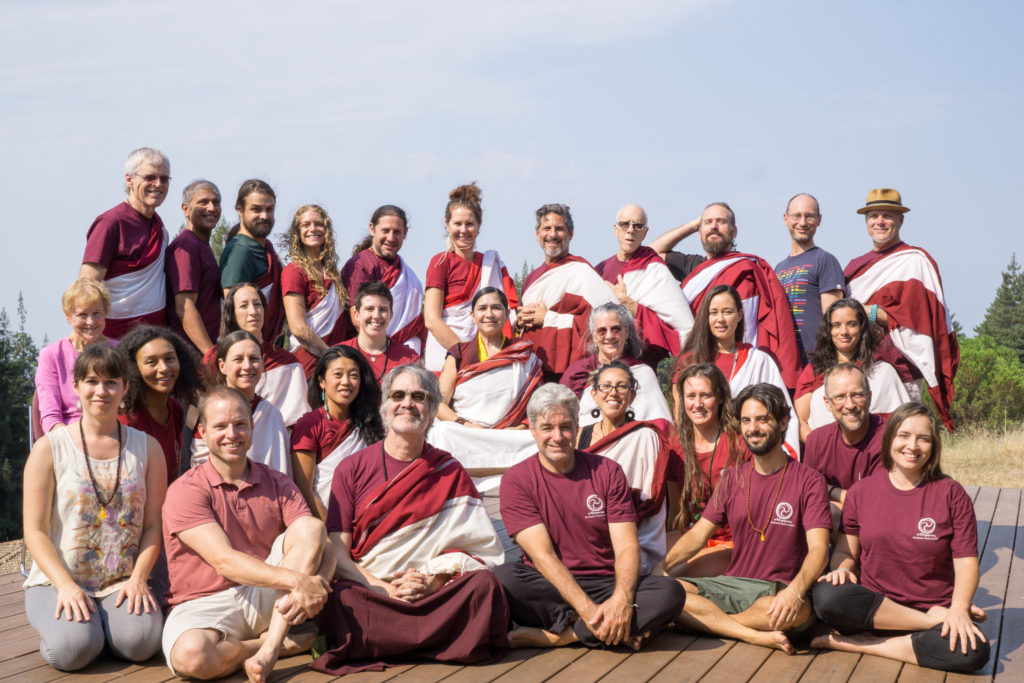
Frequently Asked Questions
Q: Do I have to be a Buddhist to attend this retreat?
A: No, this retreat is open to anyone.
Q: Does this retreat require prerequisites?
A: New students are welcome to attend this retreat without previous training.
Q: Does this retreat require silence?
A: This is not a silent retreat. There is a mixture of periods of silence and periods of socializing. Vajrayana Buddhism tends to offer dynamic settings, however, there will be an emphasis on simple meditation in this retreat. There is also a period of chanting meditation and some lectures on Buddhist philosophy.
Q: Is Dzogchen meditation secret?
A: The most advanced cycles of Dzogchen meditation are restricted practices. However, there are a wealth of practices done in the preliminary and intermediary stages, as well as practices common to both advanced and beginning levels. Additionally, there are many approaches to Dzogchen in Tibetan Buddhism. Historically speaking, different Tibetan lineages approach particular Dzogchen meditation practices at different times. Some are done only after ‘Ngondro’ the extensive preliminary meditation series for training the mind in Vajrayana. Some are done before preliminaries and others interspersed with preliminaries This retreat offers a series of particular meditation techniques known as ‘holding the mind.’ They are practiced before, during and after preliminaries because they are the main part of the path from the beginning to end in Tibet’s Nyingma lineage’s contemplative tradition. These particular practices are only taught in retreat settings because they require a deeper introduction.
Q: What diets will be accommodated at the retreat?
A: The meals are all vegetarian. Non-gluten and non-dairy options are available at every meal.
Q: What should I bring to the retreat?
A: Notebook, pen, sunscreen, sunhat, sunglasses, bathing suit if you want to swim in the Rigdzin pond, hiking shoes, comfortable clothes for sitting meditation and yoga, yoga mat, non-toxic bug spray, one nice outfit to dress up for Saturday night. If you are camping, bring your camping gear. You may also wish to bring a blanket for laying out in the meadow and a camping chair.
Q: What is the weather like?
A: Prepare for heat or cold, the mountains can be unpredictable. It is likely to be warm but may become windy or chilly at times.
Q: Is there anything I should not bring?
A: Please, no food, no drugs, no alcohol, no pets, no matches, lighters, incense, no candles, and no other flammables. Dakini Mountain requests us to not wear strongly scented body products, as these cause severe toxic reactions in some people.
Q: Is there financial aid or scholarships available?
A: The costs of the retreat are set at the lowest possible rates to cover the expenses of the retreat. Membership discounts are available – see below. Additionally, two financial assistance rates are available by application. Email info@buddhistyogis.org
Leader
Tulku Pema Khandro, Ph.D is an internationally renowned teacher and scholar of Buddhist philosophy. She is the founder of Ngakpa International and its three projects, The Buddhist Studies Institute, Dakini Mountain, and the Yogic Medicine Institute. In her work as a Buddhist teacher, she is an authorized Lama and lineage holder of the Nyingma and Kagyu traditions and was enthroned to carry on the lineage of her predecessor, the first Pema Khandro, an early twentieth-century yogini from Eastern Tibet, whose primary practices were Dzogchen and Chod. Pema Khandro has led a vibrant worldwide community since 1999. Through the Buddhist Studies Institute, she…
Learn more about Pema Khandro
